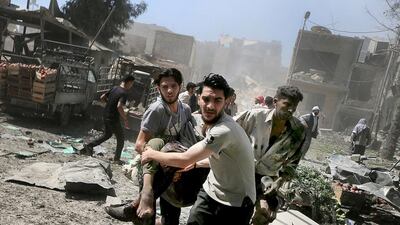BEIRUT // Heavy rebel shelling and government airstrikes around Syria’s capital on Wednesday killed at least 50 people and wounded scores more in a surge in violence just hours before the Iranian foreign minister Mohammad Javad Zarif arrived in Damascus.
The rebel shelling, apparently meant to send a message that Mr Zarif was not welcome in Syria, began in the morning with more than 50 shells striking the capital, including in the upper-class neighbourhoods of Abu Rummaneh, Baramkeh and Qasaa.
Syrian state television and the Britain-based Syrian Observatory for Human Rights said the shelling killed at 13 people and wounded dozens more.
Shortly afterward, government warplanes attacked the rebel-held suburbs of Douma, Saqba, Kafr Batna and Hammouriyeh in the Eastern Ghouta region, killing at least 37 civilians and wounded more than 100, according to the Observatory.
In a field hospital in Douma, more than a dozen bodies were placed in makeshift plastic shrouds as medical workers struggled to aid the wounded.
Inside a clinic, a young boy wept and hugged his legs – one roughly bandaged – as he sat on a blood-smeared floor next to other injured residents.
The government regularly carries out air strikes against rebel-held areas on the outskirts of Damascus, particularly Eastern Ghouta, which is also under regime siege.
On Wednesday, Amnesty International accused the government of war crimes against Eastern Ghouta residents, saying heavy aerial bombardment was compounding misery created by the blockade.
More than 240,000 people have been killed in Syria’s conflict since it began in March 2011 as a peaceful uprising against president Bashar Al Assad. Millions have been forced to flee their homes.
Iran is one of Mr Al Assad’s strongest supporters and the Iranian-backed Lebanese militant group Hizbollah has sent thousands of fighters to Syria to support government forces.
After meeting with Mr Al Assad in Damascus on Wednesday, Mr Zarif called on regional countries to “fight terrorism and extremism”.
“I say to the other [regional] players and to our neighbours that now is the time to care about the truth, answer the aspirations of the Syrian people and work to fight terrorism, extremism, and sectarianism,” he said.
Mr Zarif did not give details on his talks with Mr Al Assad on finding a solution to Syria’s four-year war, only describing the exchange of views as “good”.
However he is believed to have discussed a four-point proposal Iran wants to offer to the United Nations as a way out of Syria’s grinding conflict.
That plan, according to a Lebanese politician familiar with the proposal, includes a ceasefire and a power-sharing government that would keep Mr Al Assad in the picture, at least for now, pending internationally supervised elections. The politician, who spoke on condition of anonymity, said it showed the Iranians were “not ready” to withdraw their support for Mr Al Assad.
The enormous territorial losses suffered by pro-Assad forces in recent months may be pushing the Syrian president to explore diplomatic options to resolve the crisis. But he is unlikely to fully step aside, and if anything, he may be more inclined to cling to power in the hope that an Iran freed of economic sanctions after the recent nuclear deal with world powers would support him all the more with funds for his battered army.
Also, regional and international players, including Russia and the United States, may be more inclined to compromise on ways to end the conflict, having become more convinced that fighting ISIL overtakes the ouster of Mr Al Assad as a priority.
Analysts say there is an intense among different power centres in Iran on what to do about Syria.
“While Iranian officials have always stated they are not wedded to individuals in Syria, and that their interest lies in preventing regime implosion, they still don’t see a way of preserving the regime institutional infrastructure without Assad,” said Randa Slim, a director at the Washington-based Middle East Institute.
Mr Zarif did not mention the Syrian war during a stop in Beirut before travelling to Damascus. “We are ready to extend our hand for cooperation with all the neighbours and to exchange ideas for joint work against terrorism,” he said after a meeting with Lebanese foreign minister Gibran Bassil.
Mr Zarif also met the Hizbollah leader Sheikh Hassan Nasrallah. The group’s Al Manar television station said they discussed attempts “to find solutions in more than one country”.
* Associated Press and Agence France-Presse

